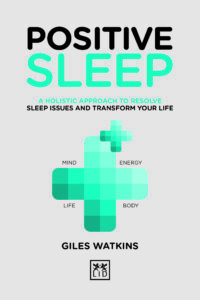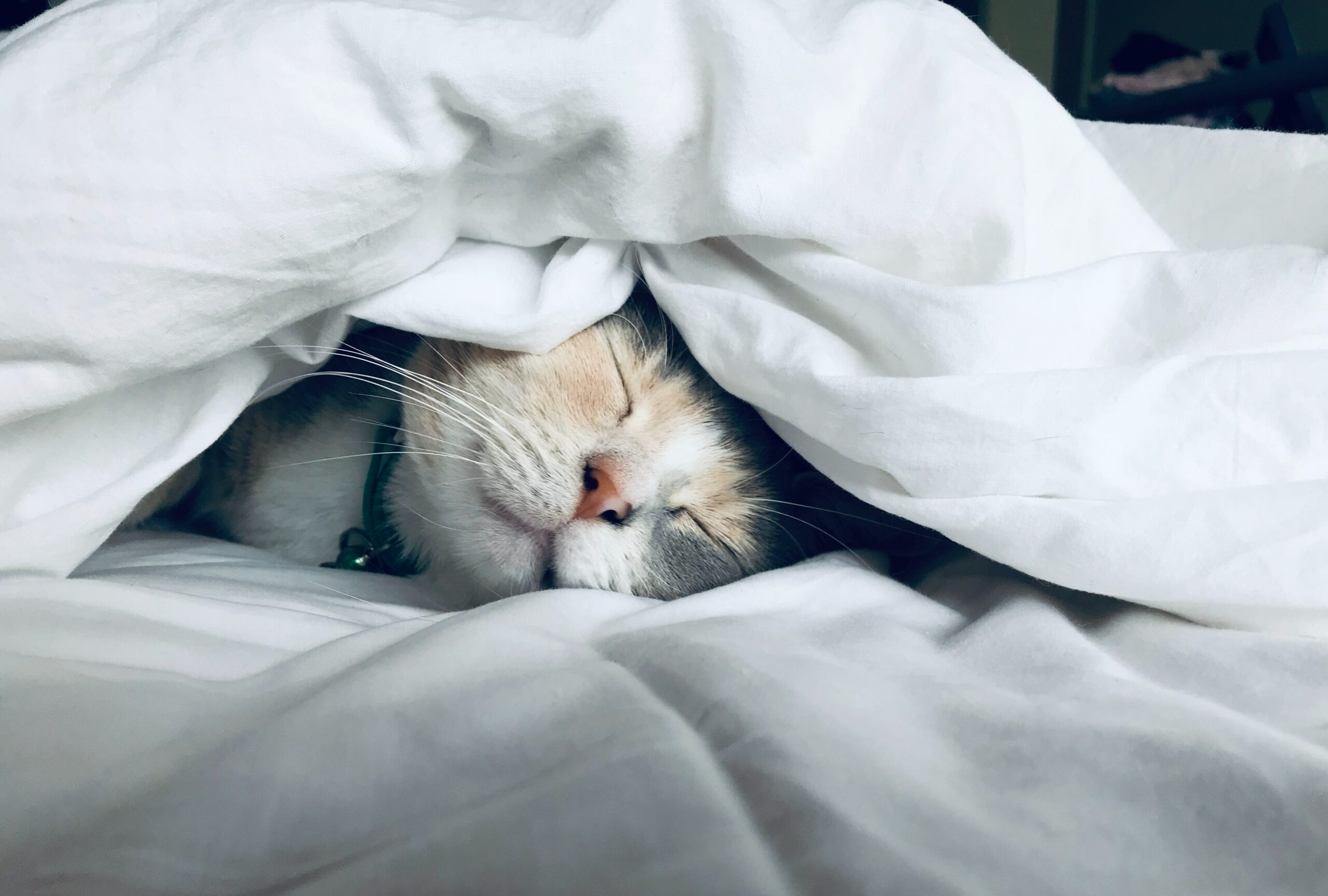Positive Sleep
Ask someone how they slept last night, and the answer is likely going to be a complaint of some sort: not enough, not deep enough, tossed and turned, was too hot, too cold, couldn’t fall asleep, couldn’t stay asleep, woke up too many times, couldn’t get my brain to shut off, on and on.
It seems that we are all facing a huge sleep deficit, and sleep challenges continue to grow.
And yet sleep is critically important to our health and success. There are so many benefits to sleeping well. We know it, but knowing and getting are two different things.
That’s why I enjoyed interviewing Giles Watkins about his new book, Positive Sleep: A Holistic Approach to Resolve Sleep Issues and Transform Your Life. He blends his own experiences as an executive with research as he struggled with sleep over the years.
Why Sleep is Essential
For those who haven’t yet read your book, you share many reasons sleep is essential. Would you share just a few of them?
One of the fascinating things about researching and writing about sleep is that we are deepening our knowledge on the subject all the time, primarily through developments in our knowledge of neuroscience. Having said that, there’s already a broad consensus as to why sleep is essential. This includes being critical in enabling our bodies and brains to recharge. Specifically, with regards to bolstering the functioning of the brain, sleep
- Can ‘restore the energy’ used by the brain for reflection,
- Enables the brain to ‘reorder and store’ the important information acquired during the day,
- Is required in sufficient quantities for the development of ‘new brain cells’ that are important in long term memory.
And for the rest of our bodies, too, if we fail to get enough sleep – both in terms of quality and quantity – this can cause significant harm to our cardiovascular, metabolic, immune and reproductive systems.
What are some of the issues that sleep deprivation causes specifically for leadership?
Clearly any leader who is significantly short of sleep is going to ‘show up’ to his team, his customers and other stakeholders below his best, both physically and mentally. Some of most immediate areas that suffer are:
Results orientation – This is critically linked to attention and concentration and reflects our ability to both stay focused and see the bigger picture. Scientists have shown that after being awake for 20 hours or more, an individual’s performance equals that of someone with a blood-alcohol level of 0.1%, the precise definition of being drunk (in the US). So, to stay focused and keep perspective on the wider issues, a good night’s sleep on a regular basis is a wonderful start.
Solving problems effectively – The mental capacities supporting this, and strongly affected by sleep, are creativity, development of insight and pattern recognition. Studies have shown that a good night’s sleep can help you spot shortcuts to solving problems, and an afternoon nap taken before 3pm has similar properties. And, of course, REM sleep has great creative thinking properties, allowing for the integration of information to develop creative solutions.
Seeking different perspectives – This definitely goes out the window when you are tired! After all, why would you want to listen to another person’s viewpoint late in the day if you have an idea what to do and simply want to get away from the office? The mental capacities of learning (and willingness to learn), memory and decision-making all require good quality and quantity of sleep to enable you to seek different perspectives. Multiple scientific studies highlight the impact of sleep on all three stages of the learning process – before learning, to encode new information; after learning, in the consolidation stage, when the brain forms new connections; and before remembering, to retrieve information from memory. Weighing up options, plus avoiding tunnel vision and bias, help a leader seek different perspectives. And, in order to avoid making critical decisions when tired, sleeping on it is well advised.
Supporting others – Also emotional reactions and developing trusted relationships, which both benefit from a good night’s sleep, are key to a person’s ability to support the teams they lead and those they work with. That’s because to help others you must first have some level of understanding of them. Often this comprehension is best achieved through non-verbal cues; in other words, it’s not ‘what’ they say but ‘how’ they say it via their facial expression or tone of voice. Research suggests that when sleep deprived, we are more likely to misread these cues, to overreact and to be more negative. Other studies show we trust less when sleep deprived, and even that our teams will be less engaged when we are in this state.
Quick Tips for Sleep
If you had to list just a few quick tips to improve sleep quality, what would you pick?
One area which can often be a ‘quick win’ for people is to gradually reduce (or even quit!) caffeine consumption. Many people don’t know much about caffeine, so when they discover that it’s in green tea, many sports drinks, chocolate, ice cream and even to some extent in decaffeinated tea and coffee, they are quite surprised. More shocking still is that caffeine has a relatively long half-life: the amount of time needed to metabolize half the amount consumed is five to seven hours. Hence a quarter of your intake at 2pm could still be in your system at midnight, with the potential to cause significant sleep disruption.
Another way is to ensure you have enough magnesium in your system, given that there appears to be a medical consensus that many of us are magnesium deficient. Magnesium deficiency can manifest itself in insomnia and conversely, appropriate levels of magnesium support deep, restorative sleep. As this essential mineral is not produced within our own bodies, we effectively need to import it. Magnesium is easily absorbed through the skin rather than orally, so a bath – with Epsom salts or other essential oils – can really make a difference to how we sleep. And if you are suffering from open wounds or sores which can be irritated by salts and oils, a magnesium rich diet, including sunflower seeds, cashew nuts and almonds plus squash and broccoli, can be helpful. In addition, or as an alternative, have some lavender oil close to you when you sleep. Placing one or two drops on a cotton pad or tissue/handkerchief can really help.
A third tip is to ‘bookend your night.’ Essentially this involves unwinding properly and letting the old day out. An hour with no smartphones, tablets, computers and, preferably, TVs too, can make a real difference. Other ways to ‘declutter the mind’ before you go sleep include tidying up, doing the dishes or putting the washing machine on, writing a journal or scribbling down some thoughts on what’s on your mind – all good ways to prepare for sleep. And then letting the new day in through allowing your day to start calmly before being overtaken by events and the agenda of others. Avoiding work and your smartphone for an hour after you wake up can really help here.
Finally, sleep is all about ‘being, not doing.’ Don’t make it another part of your ‘to do’ list! Improving your sleep is all about finding one habit that you can adopt that works for you and sticking to it for at least a month until it becomes natural, then considering what else you might do. However, do your very best not to get stressed about it, as this won’t help you sleep.
What are some of the ways employers can help?
While I firmly believe that improving your own sleep is an individual’s responsibility, employers can help hugely to create a culture where sleep is valued. Some examples are:
- Setting meetings within sensible working hours, for example between 8am & 5pm. Be mindful of the time zones of others and ask yourself if those global telephone calls truly have to be global or if you cannot do them by geographical regions sometimes and play back – perhaps literally! – input from others.
- Set boundaries on times that emails can be sent. For example, do not reply to emails after 9pm (6pm on Friday) and before 7am the next day and not on weekends. This will help everyone get some rest. Every rule has its exceptions – make these relate to a matter of life and death, losing a customer or the factory burning down. Some companies even limit access to work emails during off-work hours and weekends.
- Flexible working arrangements are now more common, and studies indicate that greater autonomy in how people schedule their time does help employees sleep more. This makes sense as it enables night owls to sleep later and start work later, or to work from home and use the commuting time saved to finish earlier, exercise, pick the kids up from school or simply sleep more. Research also suggests that productivity can improve at home with fewer distractions, plus people being able to work more at their own rhythm and at the best times of the day get less distracted and have the opportunity to nap.
- Office windows and natural light have also been shown to help employees get three quarters of an hour more sleep per night than those that don’t have the same access to natural light.
- And where possible be open to employees taking a nap in the day!
Are sleep issues increasing? Why is this?
 Conservative estimates suggest that on average in the UK we are getting between one and two hours less sleep than we were in the 1950s. Now, could it be that since this time we’ve evolved to such an extent as humans that we no longer need 7-8 hours sleep in a 24-hour period? I doubt it. What is far more likely is that the pressures and opportunities to do things other than sleep have grown exponentially since then. From the widespread impact of television through to the age of globalization and to the dawn of social media and smartphones, the ‘I’ll sleep when I’m dead’ mentality has become explicitly or implicitly widespread. Many people simply have no clue to the harm they are doing to themselves, or have merely accepted this as a price they must pay for doing a certain job, for example.
Conservative estimates suggest that on average in the UK we are getting between one and two hours less sleep than we were in the 1950s. Now, could it be that since this time we’ve evolved to such an extent as humans that we no longer need 7-8 hours sleep in a 24-hour period? I doubt it. What is far more likely is that the pressures and opportunities to do things other than sleep have grown exponentially since then. From the widespread impact of television through to the age of globalization and to the dawn of social media and smartphones, the ‘I’ll sleep when I’m dead’ mentality has become explicitly or implicitly widespread. Many people simply have no clue to the harm they are doing to themselves, or have merely accepted this as a price they must pay for doing a certain job, for example.
You share your sleep deprivation journey in the book. How is it going for you?
Thanks for asking! My sleep is much better than it was, and I certainly feel the benefits. Having said that, I still need to be mindful of making sleep a priority and making sure I catch up in the next 24 hours if I’ve had a bad night.
For more information, see Positive Sleep: A Holistic Approach to Resolve Sleep Issues and Transform Your Life.
Main Image Credit: Kate Stone Matheson

